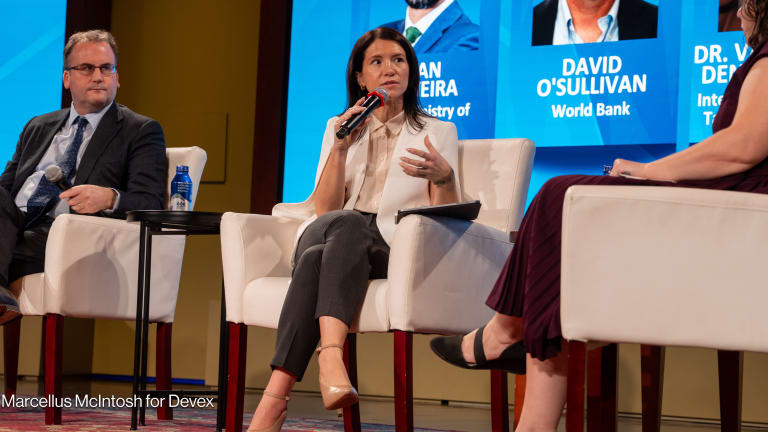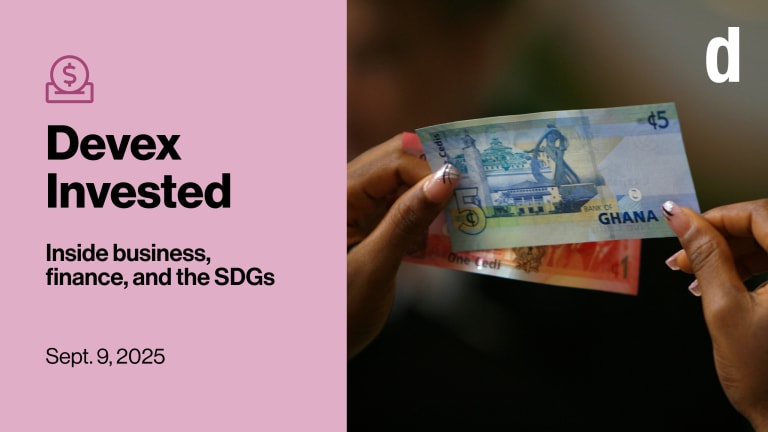Between aid cuts and debt crises, Africa bets on its own tax systems
After a decade of stalled reforms, urgency is finally driving African leaders to rethink domestic resource mobilization.
For decades, African governments have struggled to raise enough revenue to regularly fund their own development, whether that be for education, medicine, or infrastructure. They have relied instead on foreign aid to keep institutions running. During the Financing for Development conference in Sevilla, Spain, this year, experts said that there’s a $4 trillion annual financing gap in achieving the Sustainable Development Goals — and 40% of that gap, or $1.7 trillion, is in Africa. One of the primary culprits of this is tax collection. On average, sub-Saharan Africa collects just 16% of its GDP in taxes, far below the Organisation for Economic Co-operation and Development, or OECD, average of 34%. Between large informal economies, volatile revenues from oil and mining, weak tax administrations, illicit financial flows, and the eroding public trust that results from a lack of visible services, many countries on the continent struggle to secure a regular tax income, which leaves them with extremely limited public funds. But the landscape is shifting — largely because it has to. With massive cuts in foreign aid, debt crises squeezing national budgets, and global lenders pushing for stronger fiscal independence, governments across Africa are turning to digital tax systems, levies on multinational tech companies, and regional cooperation to capture revenues that once slipped away. In addition, countries are moving forward on developing a tax convention under the United Nations — something low- and middle-income countries have been pushing for over a decade. Some said it’s a silver lining to the aid cuts. “This time, things are uniquely different because it is a moment of dwindling aid,” former Ethiopian Prime Minister Hailemariam Desalegn Boshe told Devex. “I think it’s a blessing in disguise because people will wake up and try to look into their own environment and think about how to mobilize their own resources.” The problem isn’t new, but experts told Devex that the urgency is new. And that might be exactly what is needed. “The reason it’s going to work is because there’s no other option,” Claver Gatete, executive secretary of the United Nations Economic Commission for Africa, told Devex. What is DRM? Domestic resource mobilization, or DRM, refers to the process of countries raising and spending their own funds for social and economic development — primarily through taxation but also through fees, royalties, and other local revenue streams. It is seen as a cornerstone of sustainable development. The logic is simple: The more states can fund themselves, the less they will depend on aid or costly borrowing. “At the heart of this is domestic savings,” said Desalegn Boshe. “At the end of the day, it is the private sector which is the engine of growth in any country, and if we don’t have enough savings, then we cannot get the money or the resources necessary for investment.” After that, he said that countries need to focus on efficient and effective public spending to be able to attract more investment. Ten years ago, domestic resource mobilization headlined at the third Financing for Development conference in Addis Ababa, Ethiopia. There was a call to crack down on illicit tax flows and bolster regulation to fill the coffers for countries to invest in building their own resources. Low- and middle-income countries proposed a United Nations tax convention to help them institute this. But little has happened since. A decade of failure Despite years of rhetoric, Africa’s record on DRM has been disappointing with sub-Sahara’s 16% tax-to-GDP ratio. By comparison, the average tax revenue as a share of GDP for Latin America and the Caribbean was 21.3%. “Until the last one or two years, the revenue to GDP ratio has remained broadly unchanged,” Sanjeev Gupta, senior fellow emeritus at the Center for Global Development, told Devex. While there are a few exceptions — Rwanda and Kenya, for instance, which both strengthened their tax systems — overall, African countries did not make much progress on domestic resource mobilization. The reasons are familiar. Large informal economies kept millions of transactions outside government oversight. Tax holidays and incentives offered to foreign investors eroded already thin tax bases. Resource-rich countries leaned on oil or mineral rents instead of building sustainable systems. Meanwhile, the continent lost an estimated $88.6 billion annually through illicit financial flows — money that might otherwise have financed schools, hospitals, or climate adaptation. Public trust also suffered. In many countries, citizens saw little link between the taxes they paid and the services they received. Corruption scandals further undermined the legitimacy of tax systems, fueling resistance and evasion. The result: governments that continued to borrow heavily, deepening debt vulnerabilities. A decade of hope Today, the picture looks different. The twin pressures of a debt crisis and a youthful, digitally connected population are pushing governments to reform. Several countries are already reaping gains from digitalization: Rwanda’s e-tax system boosted compliance by more than 20% in just a few years, while Kenya has extended value-added tax, or VAT, to cover online services such as Netflix and Uber. Mobile money platforms across East and West Africa have created new opportunities for governments to capture previously invisible transactions. Regional cooperation is also strengthening. The African Tax Administration Forum now works with 38 member states to share best practices and close loopholes exploited by multinationals. Global reforms, such as the OECD and Group of 20 major economies’ agreement on a 15% minimum corporate tax, could further limit profit shifting out of Africa. Most significantly, a tax convention under the United Nations — something low- and middle-income countries have been fighting for for over a decade — is finally being realized. The convention held its first two weeks of negotiations in New York in August. The goal is for it to establish a legally binding instrument that will create an “inclusive, fair, transparent, efficient, equitable and effective international tax system for sustainable development.” Gatete said that countries are now requesting help from the commission to build capacity. That includes registering citizens in the tax code, tightening the regulations, digitizing the systems, closing loopholes, and finding effective public services to invest in. The U.N. Economic Commission for Africa is deploying staff to carry out this capacity building and working with national ministries of finance to understand the priorities of the governments and costs of investment, Gatete said. “If the aid that you are relying on is not coming and you have high indebtedness, which you pay back in foreign currency, what are you supposed to do? How do you survive? It's like you reach the point where you have no choice,” said Gatete. “There was noise, but then there was no incentive. And now there’s an incentive.”
For decades, African governments have struggled to raise enough revenue to regularly fund their own development, whether that be for education, medicine, or infrastructure. They have relied instead on foreign aid to keep institutions running.
During the Financing for Development conference in Sevilla, Spain, this year, experts said that there’s a $4 trillion annual financing gap in achieving the Sustainable Development Goals — and 40% of that gap, or $1.7 trillion, is in Africa. One of the primary culprits of this is tax collection. On average, sub-Saharan Africa collects just 16% of its GDP in taxes, far below the Organisation for Economic Co-operation and Development, or OECD, average of 34%. Between large informal economies, volatile revenues from oil and mining, weak tax administrations, illicit financial flows, and the eroding public trust that results from a lack of visible services, many countries on the continent struggle to secure a regular tax income, which leaves them with extremely limited public funds.
But the landscape is shifting — largely because it has to. With massive cuts in foreign aid, debt crises squeezing national budgets, and global lenders pushing for stronger fiscal independence, governments across Africa are turning to digital tax systems, levies on multinational tech companies, and regional cooperation to capture revenues that once slipped away. In addition, countries are moving forward on developing a tax convention under the United Nations — something low- and middle-income countries have been pushing for over a decade. Some said it’s a silver lining to the aid cuts.
This story is forDevex Promembers
Unlock this story now with a 15-day free trial of Devex Pro.
With a Devex Pro subscription you'll get access to deeper analysis and exclusive insights from our reporters and analysts.
Start my free trialRequest a group subscription Printing articles to share with others is a breach of our terms and conditions and copyright policy. Please use the sharing options on the left side of the article. Devex Pro members may share up to 10 articles per month using the Pro share tool ( ).
Jesse Chase-Lubitz covers climate change and multilateral development banks for Devex. She previously worked at Nature Magazine, where she received a Pulitzer grant for an investigation into land reclamation. She has written for outlets such as Al Jazeera, Bloomberg, the Organized Crime and Corruption Reporting Project, and The Japan Times, among others. Jesse holds a master’s degree in Environmental Policy and Regulation from the London School of Economics.








